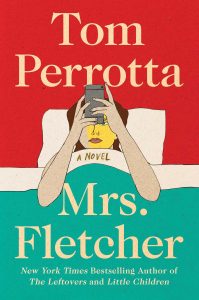 Published by Scribner 1 August 2017
Published by Scribner 1 August 2017
320pp, hardcover, $26
Reviewed by Elsbeth Lindner
Just to be absolutely clear, Mrs Fletcher isn’t Mrs Robinson (the rapacious seducer from The Graduate). Although middle-aged Eve Fletcher does have sex – a three-way, in fact – with a boy the same age as her college student son Brendan, Eve is no manipulative cradle-snatcher. Moreover, she has boundaries, of a kind. Truthfully, sexually, Eve doesn’t quite know who she is. Does she want women or men, an age-appropriate partner or a younger one? In a novel stuffed with the sexual reference points of our era – MILFs, blow-jobs, inter-racial, transgender, porn, sexts, etc – it seems like the contemporary erotic world is both bursting with possibility and intimidatingly vast.
Perrotta, author of Little Children, The Leftovers and many other novels, is deemed the master of suburbia, a satirist who has made his fortune exploring the dramas of ordinary lives in the here and now. His new novel considers the many dilemmas of twenty-first-century intimacy from the perspective of two characters, Eve and her son, and opens as Brendan is leaving for college, an episode characteristically selfish and heedless in the teenager’s treatment not only of his mother but his hapless girlfriend Becca too. But Brendan, like many others, will discover that freshman year isn’t quite the orgy of booze and blow-jobs that he and his new roommate had been expecting. Brendan’s cloddish attitude to women will lead him into a humiliation so intense that it will stop him in his tracks.
Eve, meanwhile, is coping in characteristically practical fashion with empty nest syndrome. Embarking on a gender studies class, she slowly finds her circle of friends expanding in a rather surprising way. Eve’s libido has perked up recently too, not least through frequent visits to an online porn site, and soon she finds her life dotted with flirtations of daringly different kinds.
The developmental arcs undertaken by mother and son in worlds both modern and age-old are rich material for Perrotta’s humor and social observation. Bone-headed, jock-ish Brendan is the simpler, more comical fall-guy of the pair. Eve, something of an innocent in the garden, travels further and acts, predictably, with more maturity.
And the Mrs Robinson analogy has its continuing comparisons as Mrs Fletcher too wraps up with a wedding and another dilemma of choice. No banging on doors here, no breathless escape by public transport, no idolization of the young and beautiful. Instead, pragmatism rules. For all her exploratory forays, Mrs Fletcher is grounded; she isn’t, she decides, going to give up a bird – or a lover – in the hand.
